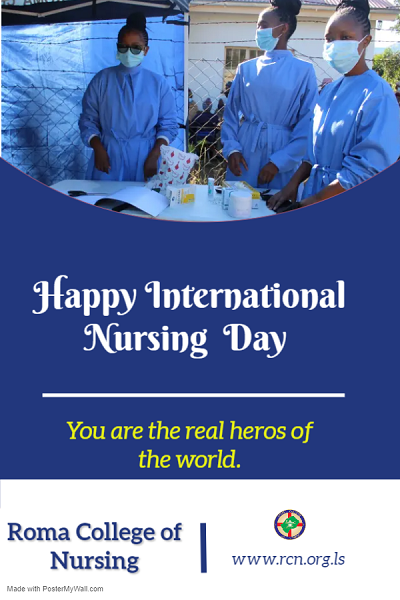May 12th is an important date to all nurses, as it is the anniversary of the birth of Florence Nightingale, who is widely considered the founder of modern nursing. In January 1974, the date “May 12th” was officially announced/dedicated as International Nurses Day. Malisema Mahloane interviews Roma College of Nursing (Roma CON) to hear more about nurses’ training education.
Roma College of Nursing (Roma School of Nursing) is a non-profit making Roman Catholic Institution under the Christian Health Association of Lesotho (CHAL). It is under the Proprietorship of the Archbishop of Maseru. It is also the integral part of St. Joseph’s Hospital, aiming at providing nurse’ training education for the candidates of both Diploma in Nursing and Midwifery responding to the manpower needs of Lesotho within the health care system. As such it is open to all candidates of any gender and various religious background. The college was established in 1972.
- How important is May 12 for you as a nursing school?
This Day is a Memorial/ Reflection Day – in remembrance of the Founder of Nursing Florence Nightingale that is worth celebrating as the School of Nursing which is an opportune environment for teaching and learning. It serves as a professional reminder to the mandate of Nursing. To note is that Nightingale’s philosophy and teaching emphasizes that Nurses must use brain, heart, and hands to create healthy environments to care for the patient’s body, mind and spirit. (Totality)
- Can you explain the theme of this year and its impact to you as a nursing institution?
The Theme “OUR NURSES, OUR FUTURE” further reiterates the Nursing Education responsibility and accountability on investing in Nurses today to address the current and future health care needs and challenges that the humanity faces at local, regional and international levels noting that individuals who might be healthy today are also future patients/clients.
- What celebration activities if any can be expected by the school on Friday the 12th?
The Roma College of Nursing will align with the already planned activities by LNA which include sports, entertainment in other forms but mostly show casing the community engagement activities already engaged in.
- After graduation young people are constantly reminded and encouraged to become entrepreneurs and provide jobs than look for jobs. Is this also the case in the nursing field?
The element of entrepreneurship is considered critical, however newly graduated Nurses are required to gain some experience prior engagement into private practice or as an alternative to partner with those who already have such practice so as to gain the required experience.
- What are some of the business ideas that Roma college of nursing encourages for nurses or students who want to explore their entrepreneurial spirit?
Roma CON promotes open-mindedness to students and innovation which is supported by the current curricula approach which is competency based and allows exploration.
- Opening a private practice is regarded as one of the many ways in which healthcare workers can use their skills in business. Does Lesotho give full-practice authority to nurse practitioners and do we see improved health services, patient access to healthcare, reduced medical costs?
If individuals satisfy conditions of private practice then chances are access to health care services will be increased, however medical costs will be determined by the socio-economic status of the country. Private versus public concept will still prevail.
- In your view, how satisfied are you that Roma nursing school is answering to the critical human capital needs of the country’s healthcare sector?
Roma CON is responsive to a large extend but there is still room for improvement through offering of other programs that are informed by the national human resource needs at hand such as introducing Oncology Program given the scourge of cancer in all forms.
- Can you mention some of the major challenges students continue to face in the workplace (internship) and how they can be resolved.
- Low patients flow compared to the students’ ratios – use of skills laboratories to complement real patients’ scenarios.
- Inadequate number of trained Preceptors to complement students’ supervision – increased numbers of Clinical Supervisors and trained Preceptors who are remunerated.
- Competing of Nursing Institutions for placement of students as they are limited especially the specialized services facilities. – drawing and adhering to the Master Plan by all schools of Nursing to avoid overcrowding.
- What notable successes has the college achieved to this date?
- Production of employable Nursing and Midwifery graduates locally, regionally and at international levels.
- Offering of accredited programs by the relevant Regulatory Bodies – Lesotho Nursing Council (LNC) and Council on Higher Education (CHE).
- Work in progress towards achieving an academic independence and empowerment from the Hospital as Higher Education requirement.
- The College has acquired a new site for expansion in future.
- Lastly, what are the most critical issues you wish the government could urgently address as far as the college is concerned? In what ways?
- Increase the quota for sponsored students through NMDS and other structures so that new programs could be catered for as most student cannot afford the required fees.
- Support the capital budget through increasing targeted subvention in order to improve infrastructure development (allowing face to face and reliable online courses)
- Robust review of the establishment lists within the schools of Nursing in order to accommodate new developments and educational demands.
- Creating job opportunities for graduates through enabling environment. (Acts, policies)


